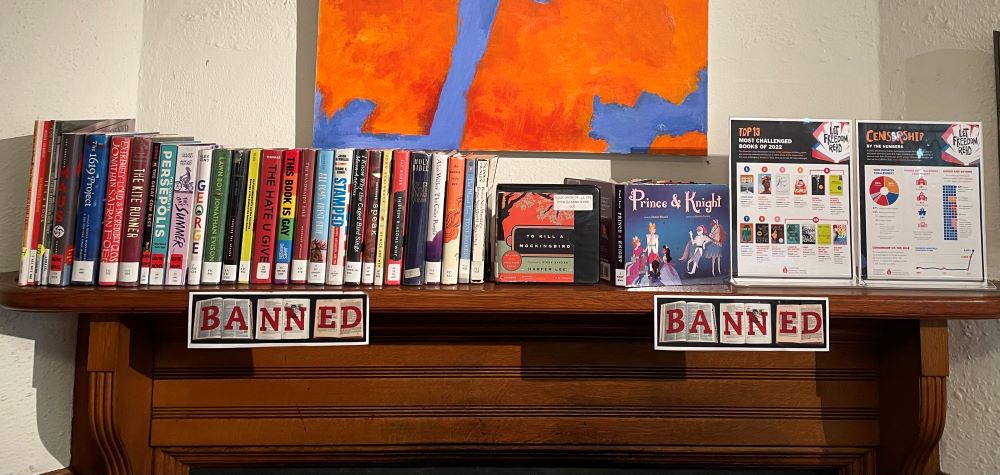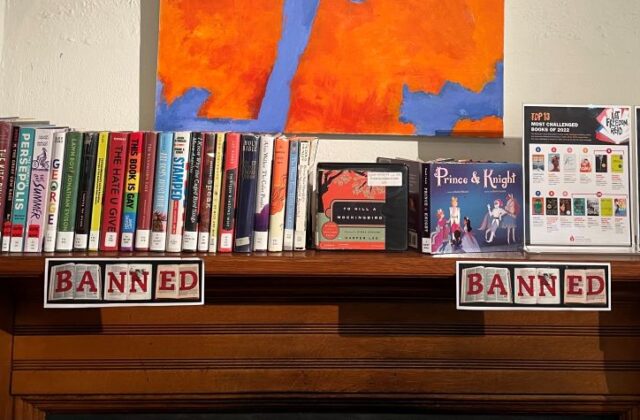As Challenges to Library Books Surge, Norfolk Library Celebrates the Freedom to Read
By Bina Thomson
What began as a pushback against book bans has become a modern fight against censorship. Established in 1982, Banned Books Week, generally held the first week of October, is an annual event recognized by libraries, bookstores and intellectual associations across the United States.
To further educate the public on the issue, the library hosted Lindsay Delligan, director of the Jonathan Trumbull Library in Lebanon, Conn., and co-chair of the Connecticut Library Association Intellectual Freedom Committee for a talk on the importance of intellectual freedom as stated in the Library Bill of Rights. Delligan provided information on the national increase in book challenges (an attempt to remove or restrict material) and discussed how intellectual freedom is threatened by growing censorship efforts.

Photo by Bina Thomson.
For this year’s Banned Books Week, the Norfolk Library created a display of books that have been the focus of current or historical attempts at censorship and provided information on the national increase of book bans over the last three years. Classics like “To Kill a Mockingbird” and “Of Mice and Men” were displayed, along with picture books such as “Something Happened to Our Town” and “It’s a Book.” The display prompted interest and conversation among patrons, which was the goal.
Citing data from the American Library Association, Delligan reported that there were 729 book challenges in 2021. This number nearly doubled, to 1,269, in 2022. Preliminary data for 2023 documents a continuing rise, with 1,915 unique titles challenged between Jan. 1 and Aug. 31, an increase of 20 percent from the same reporting period in 2022. Of the titles challenged in 2023, most were books written by or about a person of color or a member of the LGBTQIA+ community.
While not every book challenge results in a ban, the increase in book challenges is troubling. These challenges mainly come from organized censorship groups that target local library board meetings to demand book removals. Book lists are shared on social media, and these groups often use their religious and political affiliations to inform their challenges to material by or about the LGBTQIA+ community and people of color.
One such group, called “Clean Up Samuels,” from Front Royal, Va., hosted two book-banning events last spring with the intention of overwhelming Samuels Public Library. The event advertised “free beer and babysitting,” and attendees filled out over 500 forms requesting reconsideration of library materials, targeting 150 unique titles for removal. These materials were young adult and children’s books about experiences of the LGBTQIA+ community. The group tried to pressure the library’s board to withhold 75 percent of the library’s funding over the availability of these titles. The number of challenges completely paralyzed the library, and the library director resigned.
Such groups take advantage of the reality that fewer parents are actively engaged in what their children are reading and instead rely on the guidance of others to decide what’s appropriate. Some parents can be swayed by fear-mongering and hype on social media and will challenge books they have not read. Delligan stated emphatically that “limiting your child’s access to a book because you deem it inappropriate is well within your right, and responsibility, as a parent. However, you can’t restrict others’ access to it as well.”
Books with diverse viewpoints are the most challenged, and it is critical to the ethics of library professionalism that libraries continue to have diverse collections. Children’s literature traditionally falls short in representing diverse viewpoints, and the bans targeting children’s books are especially harmful. Delligan shared, for example, that more than 70 percent of children’s books are about white characters. This clearly fails to represent the racial diversity of the United States. Norfolk Library Director Ann Havemeyer established a diversity audit a few years ago that reviews all incoming books to ensure that the overall collection represents diverse voices and experiences.
As attempts to censor material in libraries continue to rise, it is more important than ever that libraries are supported by their communities. “The best thing patrons can do is to stay informed,” said Delligan. “Read the books your children are reading, read banned or challenged books to establish your own opinion and recognize when misinformation about a book or library is circulating online. Submitting material requests in support of marginalized voices will help add them to your library’s collection. Review a book for the community.”
“It is our role not to decide what you read, or endorse it, but to give you that choice,” explained Havemeyer, on behalf of the Norfolk Library. “The work of librarians right now, in this moment, in our state and in our country, is to protect the freedom to read.”

